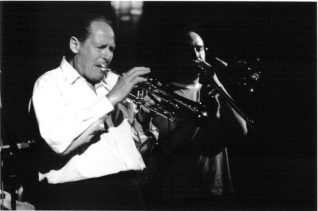Tim - The jazz scene

The one constant thing
Jazz music has been ‘the one constant thing’ in Tim Wade’s life. Tim grew up in Horsham but chose Brighton as his city, for its friendly people and lively music scene.
Tim, a trombone player, started out as a classical musician. He was attracted to the social nature of the jazz scene, and also to the fact that it’s very ‘generational’: ‘There were all these retired musicians who’ve all been in…famous name bands and on the radio and you get to play with them.’ The generational aspect of jazz extends to the way that younger musicians, such as Rob Heaseman and Ben Sarfas, are constantly enlivening the scene: ‘When I used to be the youngest guy in the band I’m now the one booking the young guys in the band!’
Hard work
Tim’s primary education as a jazz musician took place in Boston, U.S.A., and at Guildhall in London. He returned to England with a new appreciation for the country. While individual lessons taught him technique, college taught him improvisation: ‘learning to play what you hear in your head.’
It took about ten years for Tim to move from working in computers to achieving his goal of being a full-time musician. He enjoyed a long and refreshing break working on cruise ships. ‘It’s a great job for a musician…It’s like a permanent holiday.’
It may be fun, but being a musician of any kind also requires hard work: ‘To be really good at some point in your life you’re gonna have to spend a few years absolutely locking yourself away and practicing like mad.’ When it comes to practice, Tim is ‘fanatical and obsessive’ but wishes he could practice more! When he pulled a facial muscle and wasn’t able to play for several months, it was a shock: ‘It really brought back to me how much I absolutely loved playing.’ Playing is a meditative experience for him: ‘If you’re ever worried…you can always go and play and it will take your mind off whatever you were doing before, very therapeutic!’
Musical inspiration
As for musical inspirations, Tim’s jazz idols are Jimmy Knepper and Glenn Ferris. He’s also very influenced by Kenny Wheeler, who he recently met in a lift when Wheeler was playing for Brighton Jazz Club. Tim has other memories of meeting jazz giants. As a teenager, he met Dizzy Gillespie at the Royal Festival Hall: ‘I went up and shook his hand, and he had a grin about two foot wide.’ He also met Jerry Bergonzi, an ‘absolutely amazing sax player’: ‘I’ve never seen anyone with so much drive and focus.’
Brighton offers a range of exciting jazz venues: The Hanbury Ballrooms, Casablanca, The Lift, the Komedia, and The Old Market, all of which Tim regularly plays at. Tim’s favourite is Monday nights at The Hanbury – ‘It’s very friendly and whenever there’s a new player I always try to get down and meet the other people. It’s kinda like a coffee morning for jazz musicians – at one o’ clock in the morning or whatever,’ he laughs.
The jazz scene is relatively open to newcomers: ‘A lot of people go down to the Hanbury ‘cos it’s a late night drink, and if the band are performing well people respond, they get up and dance…that wouldn’t normally come along to jazz.’ However, jazz can be quite specialist, requiring more ‘concentration’ than some other music genres.
Jazz revival
Tim feels that jazz is going through yet another revival: ‘It’s like a rollercoaster.’ One of the strengths of jazz is that ‘it gives you a basis to either go off and play the other styles, or to try and crowbar them into what style you want to do.’ As for the future of jazz: ‘I hope it merges more with hip hop and those kinds of things, ‘cos it’s gotta be an involvement thing…what we really want to see is jazz influence on pop and pop influencing jazz.’ There’s one thing Tim would like to see change in jazz: ‘It’s still a very male bastion and I think that’s a real shame.’
Currently Tim plays in several different bands, including showbands (playing at the Theatre Royal and the Gardner Centre). He also finds time to write and sell arrangements. Tim is constantly inspired by hearing other musicians: ‘You’re sitting in a band and you’re both looking in and listening out, it’s a really wonderful thing to do…I think you can tell within five minutes when people play, who they’ve been listening to. And hopefully you’ll hear something surprising you haven’t heard.’




No Comments
Add a comment about this page